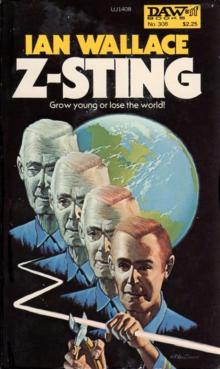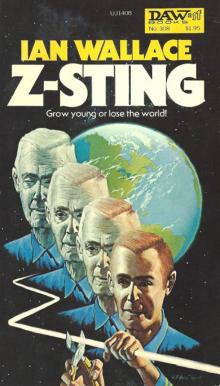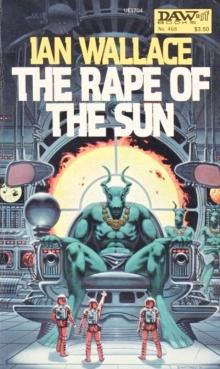- Home
- Ian Wallace
Z-Sting (2475 CE) Page 6
Z-Sting (2475 CE) Read online
Page 6
The base captain stood now at mast-end of a flyway to the main hatch, flanked by a commander and a lieutenant-commander. In a fine simple old traditional ceremony dating back to the twenty-second century, he bawled: “Commander Marana, pray emerge!” His flanking officers snapped to salute while the captain stood at attention.
Marana—a big flashing-handsome thirty-three-year-old Senevendian darkling—stepped onto the flyway and saluted the captain, who countersaluted. The captain and his flanking officers and Marana then snapped to; and Marana gravely traversed the spiderskein flyway (moonsurface two hundred meters below) and shook hands with the captain and the two officers in descending order of rank. (In cases where both flanking officers happened to enjoy the same rank, a visiting skipper had to make a snap date-of-rank judgment.)
Marana was accorded the unusual privilege of reporting to a bleak skinny iron-grey rear admiral named Stultz who commanded External Security Intelligence at the base. Stultz got his guest seated before his desk and primly offered him a drink; seeing that Stultz wanted one, Marana gravely thanked him; Stultz mixed two bourbons and branch, served, sat and got going. Eventually it came to this:
“Commander, you have already been retinally identified. What position do you want on Moon for your experimental hypertelecom?”
Marana had been coached on Rab in the best possible way: he knew all about his mission, and he knew exactly what to conceal; he had also been hypnotically prepared to scuttle all secret knowledge by flooding his own memory banks with jamming trivia in event of a threatened psychoprobe. He now instantly gave the recommended latitude and longitude of their proposed station in the Sea of Serenity, adding: “This will place us in optimal position for signals direct to Rab. We hope to achieve transmission velocities as high as 2 C. You are at liberty, sir, to monitor our signals.”
Nodding, Stultz went into a cross-check of the major equipment and crew lists transmitted from Rab against the results of the scansion here at Moonbase. The advance equipment included a tempopattern sampler, an autocrew, and parts for the translight communication studies.
Stultz concluded: “I may say that all equipment items and crew lists check, right down to a superannuated fourth-class custodian, stores. I have only one remaining question. After setting up your hypertelecom base in the Sea of Serenity, you propose to take your ship to Erth for scansion of megalopolitan tempopatterns; but the orders add that you may take off after targets of opportunity. Give me a hypothetical instance of a target of opportunity.”
Without hesitation: “If in a particular megalopolitan tempopattern we should find a pattern variant which might have an extraterrestrial cause, we might make side excursions elsewhere in the Sol System to find and analyze the source of disturbance. We would first notify you of our plan and purpose and would accept guidance or negation.”
The admiral stood. “That appears satisfactory, Commander. If you have quite finished your drink—”
That was when, having admitted the Mazurka to Sol space, External Security routinely handed the matter to Ziska’s Internal Security and forgot about it. The transfer of responsibility was effected far below Ziska’s level.
The Sea of Serenity had just entered 18 May nightside. The transparent plastic huts which they unlimbered from the Mazurka, inflating them in the floodlighted area so that the plastic writhed and shuddered into formally shadow-various grotesqueries, were nearly perfect insulators by reason of the gas in their self-sealing quadruple walls. When the station would eventually find itself revolved and rotated onto sunside, refrigeration would gradually replace heat in the atmospheric generator.
Subordinate officers could see to the general outfitting of the installation, but it was Commander Marana who personally supervised the piece-by-piece unloading of the peculiar hypertelecom apparatus. The pieces were floated on antigrav: each lift-unit could be massively laden, here on the moon. They were pushed and pulled through the airlock of a vitalite shelter whose basic dome shape was distorted by numerous excrescences. Inside, the swift assembly of these pieces was directed by . . . eh, it was the superannuated fourth-class custodian, stores. And he was pretty old, too! And the morale of this crew was underscored by the way men who ranked him by several ranks jumped when this old nobody spoke . . .
After nine hours of uninterrupted labor, it was the old custodian who sat in a bucket seat before an elaborate instrument board that fronted a voluminous array of circuitry (all open, not neatly housed in a patented console but gaping its guts like a mad scientist’s improvisation) and nodded to his—assistant? But this assistant to a custodian was a first-class telemetrist! Together they went through an intricate test procedure, while four other specialists scurried around checking details. Through the vitalite, suited Commander Marana watched intent.
Finally the old custodian said in a firm baritone: “Good. Let’s try for Rab.”
Marana came inside and whipped off his helmet.
The custodian’s fingers played controls. He said, without bending to any visible sort of transmitter or microphone or mouthpiece: “Testfox calling Testhound. Come in, Testhound. Over.”
Ten seconds of silence. Clear response: “Testfox, this is Testhound. Over.”
Seconds of silence, while the men on Moon exchanged awed looks: signal and response across more than four light years of interstellar space had been effected in ten seconds round trip!
The old custodian was taut “Testhound, apparently one-way transmission takes about five seconds. Pretty good?”
Instant answer from Herod on Rab: “Damn near perfect!”
Shortly afterward, rather surprisingly the entire floor of the shelter—men, machines, all—sank slowly beneath moonsurface to a depth of three meters; a new floor of opaque material slithered out from the ground-level periphery, covered them entirely, and rigidified; and a new crew began moving new pieces of machinery into the shelter and assembling it on the false floor. Meanwhile, rather confusingly, the suited figures of the three telemetricians, two reonicists, commander, and custodian who had disappeared underground emerged from a nearby shelter and moon-loped for the Mazurka, disappearing within.
They all hit the sack. Croyd didn’t know that they were terminating the day when, in Senevendia, Keri Andhra discovered the 1•31 COMCORD imbalance.
A large moonskimmer appeared next day at 1300 hours, immediately after chow, while Marana was directing preparations for ship’s departure. The skimmer bore neither the Erthworld Astrofleet insignia nor the Sol/Centauri insignia but the silver head of a serene woman with stars in her hair: Stella Maris, goddess of Mare Stellarum, Sea of Stars.
Commander Marana stood by while a lieutenant met the craft and saluted seven emerging suited-up civilians, three of whom were women. Monitoring their conversation by helmet intercom, Marana joined the group as soon as the leader identified himself as Mr. Fulatta of Mare Stellarum Internal Security. Vendic Marana saluted African Fulatta, and they touched gauntlets.
Fulatta presented his assistants, four of whom were telecom specialists, and expressed a terse wish to examine the experimental hypertelecom installation. Marana led them into the shelter, where they unsuited and began a meticulous inspection of a working device that crudely resembled the one in the hidden basement. Presently they began questioning the telemetricians:
“Any results yet?”
“Nothing positive, sir.”
“It really seems unlikely that a rekamatic impulse could exceed light velocity.”
‘True, ma’am. But we are trying to generate an integral corpuscle which will travel through space at translight velocity as a discrete particle rather than a self-propagated pseudo corpuscle. It is the latter, we theorize, which is limited by the Lorentz equations.”
“But the former has to buck the Fitzgerald contraction without the help of a differential mass—”
“A classic objection, we admit.” This telemetrist was enjoying his own screening double-talk: he rather sniffed “classic”; and he added: “
Ladies and gentlemen, if you would like to see our mathematics, we can speed-read them in a nearby shelter—”
But they had no time today, they would return tomorrow.
Even as the visitors were suiting up to leave, a to-them-inaudible voice in the basement was saying: “Testhound, this is Testfox. Our dummy is getting fey. Marana and I are leaving now for Erth and elsewhere, my assistants will take over. You’ll hear from me soon, I hope—with a result or two, maybe. Over and out.”
The Mazurka cruised, now on 20 May, in a leisurely harmonic pattern ninety kilometers above the Chicago/Manhattan or Chihattan megalopolis, describing a complete circuit, larger or smaller and in variable patterns, on an average of each quarter-hour. This was an experiment-and-reconnaissance cruising level established long ago by Norwestia Constellational Aerospace, banned to transport and satellites and swept clean of garbage: crews had only to watch out for craft ascending or descending through the zone.
Commander Marana stood on the bridge, peering down through the lower curvature of the broad bay window at the irregular marges of the megalopolis: river-trailing across mountains and clustering on plains and at lake edges, fanning out at seaboard from Boston down to Charleston, partially obscured by trailing cirrocumulus cloud puffs. Had he wished to penetrate the clouds and see the city-complex clearly, a button-touch would have replaced the window with a visiradar viewport.
Beside Marana stood the superannuated custodian. He was a rangy man, nearly as tall as Marana; his bones were respectable, but most of them protruded, and he weighed no more than sixty kilograms; he looked aged, but healthy and even sinewy. His eyes were clear deep blue, his head long, his mouth big with an upward twitch tendency at the corners, his short gray hair tinged with auburn near the roots (a self-induced change from his old Thoth Evans chestnut brown hair). He wore civilian work overalls rather than a uniform.
“You are not omitting,” suggested Custodian Croyd, “to break the pattern down into major components?” His baritone was not aged.
Marana responded economically yet respectfully: “As requested, sir, we are taking microanalysis flakes of the following Chihattan burroughs: Boston, Manhattan, Philadelphia, Washington, Baltimore, Pittsburgh, Buffalo, Cleveland, Detroit from Toledo to Flint and Grand Rapids, and Chicago from Gary to Milwaukee. These local intensities are additional to the overall megalopolitan pattern. Do you know yet how you will use these samples?”
Croyd negated. “The sampling is our pretext for being here. It happens also to be related to COMCORD, but I don’t know yet what that has to do with anything immediate.”
They returned their attention to the view below.
A lieutenant across the bridge, seated at a scanner, spoke quietly. “Sir, I think we have a periodical disturbance of extraterrestrial origin.”
“This,” Croyd intensely reminded Marana, “is a major part of our mission.” They crossed the bridge and bent over the lieutenant, analyzing and synthesizing pointer readings.
Said the lieutenant finally: “I think, sir, Neptune.”
Straightening, Marana and Croyd gazed at each other. “By damn!” exulted Marana. “First one!”
Croyd urged: “You’d better have the lieutenant take time to make sure. I have to pay that visit to Manhattan. Keep me monitored—one never knows, with Mare Stellarum.”
“Aye aye, sir. Mr. Croyd—”
“Commander?”
“It has to be alone?”
“It has to be alone.”
Marana’s big chin was up: he had an embarrassing thing to say, so he banged it right out. “Watch it, sir. You aren’t young.”
It brought up Croyd’s mouth corners. Going away, he backtossed at Marana: “Younger than when we left Rab—and you should have seen me on Mayday.”
Departing the Mazurka in a scouter, Croyd, decently dressed in a gray civilian suit, dropped to the bottom of the reconnaissance band, flashed ship’s ID to Astroport, and requested an entry hole. They gave him one, and he eased eighty kilometers to the four-hundred-meter vestibule; there he leveled off, flashing arrival notice, and floated waiting, examining with interest the wild Manhattan skyline—still the loftiest on Erthworld, and subtly changed since his last view of it most of a century earlier, dominated now by the kilometer-high Erthworld Union Tower on East River (its smaller sibling in the same park was the Sol/Centauri Building).
Radio came in: “Arrival of Mazurka scouter acknowledged. Furnish plan.” It was a computer with a soprano voice, a lingering reminder that human control-tower personnel had been overwhelmingly female by the twenty-first century.
Croyd stated: “Destination Erthworld Union Building, Civilian BuPers. I will take this craft there.”
Pause for relays. Then: “Personal identity required for such clearance.”
He slipped his retinal ID card into a slot and placed his eyes against the eyepiece for comparison. The retinal prints were genuine; the remainder of the card had been carefully fabricated on Rab to identify Croyd as Hertz, a Civilian Official 7-P (seventh-level, Personnel) of Mare Stellarum, date of appointment 6 May 2475. It was a bit risky: Rab Chairman Herod had clothed Rab with a completely fictitious identity as part of an organization that was not Herod’s. But: “Mare Stellarum BuPers is at least three months behind in programming all major computers with personnel changes,” Herod had commented, “and the chances are that anything away from Central has a covering program to admit correlation of a genuine retinal with one of their unforgeable ID’s.” It now seemed to be working: Croyd-Hertz got immediate clearance at the thousand-meter level—it was a zone fifty meters thick reserved for Erthworld officials. He rose to that level and moved laterally toward the Erthworld Union Tower.
Coming in on the tower-top where it fanned out into a broad enclosed deck, he paused five hundred meters away, while official scouters and helijets at the same level arrived and departed on other radii all around the tower or hovered like himself awaiting clearance; and he signaled for a human counter bypass. This was rare, and in a moment a young officer’s face appeared on his visicom. “Lieutenant Carlton here,” she asserted in a modulated mezzo much like that of the Astroport computer. “Please come on visual and state why human bypass is required.”
He switched on visual transmission. “Civilian 6-P Hertz, accompanying the Rab frigate Mazurka as monitor for Mare Stellarum. I pulled this rank a month ago, and I just noticed that some dope at BuPers has associated my retinals with an ID card that says 7-P instead of 6-P” (the latter was higher). “So I want to see Assistant Secretary Fiori immediately, the reduced rank is messing up my operation.”
Carlton’s pretty mouth tightened: she was skeptical, yet impressed by the claim of 6-P rank. Her lieutenancy in Astrofleet was equivalent to Rank 9. “Show me your card and your eyes.”
Croyd-Hertz repeated the Astroport performance—holding breath, because possibly the Central computer had been brought up to date for a change.
A moment later, Carlton looked impish. “Excuse me for saying so, sir, but apparently you didn’t inspect your new card any better than the dope at BuPers did.”
So that was all right; and now Croyd-Hertz had a snap decision to make, whether to reinforce his 6-P role by reprimanding her for impertinence. He chose instead to blush and grin. Her humorously twisted mouth broke into a smile; she gave him an entry lane and disappeared to check his request with the office of Assistant Secretary Fiori.
Croyd-Hertz now stood before the window-centered desk of Assistant Secretary Fiori who sat grim behind it, a slight gray sixtyish asthenic with hands folded tightly on his blotter. Fiori’s high rank was 4-P, which was why he rated a nonfunctional blotter. His desk was flanked by two flags, the twin stars of Sol/Centauri at his right, and at his left the starry-haired goddess of Marta’s Mare Stellarum; centered on the picture window behind him was a third flag, the multi-colored banner of Erthworld Union. Missing no diplomatic bets, this Manhattan-stationed bureaucrat also displayed on the wall above the window the hi
storic fifty-seven stars and thirteen stripes of the United States of Vespucia. Over a Fiori shoulder and through this window, Croyd-Hertz could see a great deal of Long Island.
Also flanking the desk but in front of the flags, standing at severe ease, were two uniformed guards with holsters loosened. Croyd-Hertz alertly surmised that these guards were not standard office equipment.
Fiori said carefully: “I do not know you, Hertz. It is barely possible that there is a new 6-P whom I do not know. However, I have just run a check on all ninety-three civilian Hertzes having numbered rank in Mare Stellarum. None of them is a 6, and none has your retinal pattern.”
Croyd-Hertz hit Fiori with a mild shot of projective hypnosis (as a matter of social ethos, Croyd reserved the use of this talent for extreme operational emergencies). He then countered: “I am a new 6-P, it is quite possible that you would not know me; and it is also quite possible that your files on other divisions are only somewhat more up to date than the computer at the landing stage.”
Without changing expression or position, Fiori nodded slightly. “Quite possible.”
“Then I suggest you dismiss your guards so we can talk comfortably.”
Fiori waved a hand over a shoulder and reclasped hands; the guards snapped to, clicked heels, locked holsters, and departed.
“You might also let your secretary and your aide know that all is provisionally well.”
Fiori said quietly into his intercom: “Mr. Hertz is provisionally cleared. We wish to talk privately. Disconnect.” He then looked speculatively at his visitor.
“First of all,” began Croyd-Hertz, “please do me the favor of personally correcting this ID card and inserting a master engram into the BuPers computer. And then I wish to discuss a man named Croyd—”
It wouldn’t always be so easy. People like Marta and Ziska possessed trained shields against projective hypnosis and telepathic intrusion; Fiori probably had a feeble shield, but it hadn’t occurred to him to erect it against this Hertz—which was probably one of the reasons why Fiori at his age was only an assistant secretary. Whereas nice guys like that little Carlton shouldn’t be dealt with so unfairly: with them, if straight persuasion wouldn’t work, the worst his creed would allow was normal human duplicity which their minded brains ought to be able to deal with.

 Megalomania
Megalomania Z-Sting (2475 CE)
Z-Sting (2475 CE) The World Asunder
The World Asunder Z-Sting
Z-Sting Lucifer Comet (2464 CE)
Lucifer Comet (2464 CE) A Voyage To Dari
A Voyage To Dari Pan Sagittarius (2509 CE)
Pan Sagittarius (2509 CE) The Rape of The Sun
The Rape of The Sun